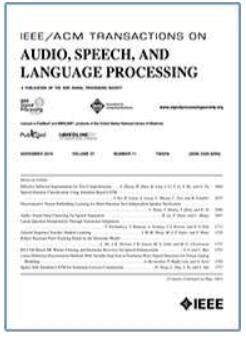Unsupervised Speech Enhancement Using Optimal Transport and Speech Presence Probability
IF 4.1
2区 计算机科学
Q1 ACOUSTICS
IEEE/ACM Transactions on Audio, Speech, and Language Processing
Pub Date : 2024-10-02
DOI:10.1109/TASLP.2024.3473318
引用次数: 0
Abstract
Speech enhancement models based on deep learning are typically trained in a supervised manner, requiring a substantial amount of paired noisy-to-clean speech data for training. However, synthetically generated training data can only capture a limited range of realistic environments, and it is often challenging or even impractical to gather real-world pairs of noisy and ground-truth clean speech. To overcome this limitation, we propose an unsupervised learning approach for speech enhancement that eliminates the need for paired noisy-to-clean training data. Specifically, our method utilizes the optimal transport criterion to train the speech enhancement model in an unsupervised manner. It employs a fidelity loss based on noisy speech and a distribution divergence loss to minimize the difference between the distribution of the model's output and that of unpaired clean speech. Further, we use the speech presence probability as an additional optimization objective and incorporate the short-time Fourier transform (STFT) domain loss as an extra term for the unsupervised learning loss. We also apply the multi-resolution STFT loss as the validation loss to enhance the stability of the training process and improve the algorithm's performance. Experimental results on the VCTK + DEMAND benchmark demonstrate that the proposed method achieves competitive performance compared to the supervised methods. Furthermore, the speech recognition results on the CHiME4 benchmark show the superiority of the proposed method over its supervised counterpart.利用最佳传输和语音存在概率进行无监督语音增强
基于深度学习的语音增强模型通常采用有监督的方式进行训练,需要大量成对的噪声-清洁语音数据来进行训练。然而,合成生成的训练数据只能捕捉有限范围内的真实环境,而收集真实世界中成对的噪声和地面真实的干净语音往往具有挑战性,甚至是不切实际的。为了克服这一限制,我们提出了一种用于语音增强的无监督学习方法,这种方法不需要成对的噪声-清洁训练数据。具体来说,我们的方法利用最优传输准则,以无监督的方式训练语音增强模型。它采用了基于噪声语音的保真度损失和分布发散损失,以最小化模型输出分布与未配对的干净语音分布之间的差异。此外,我们还将语音存在概率作为额外的优化目标,并将短时傅立叶变换 (STFT) 域损失作为无监督学习损失的附加项。我们还将多分辨率 STFT 损失作为验证损失,以增强训练过程的稳定性,提高算法的性能。在 VCTK + DEMAND 基准上的实验结果表明,与有监督方法相比,所提出的方法取得了具有竞争力的性能。此外,在 CHiME4 基准上的语音识别结果表明,所提出的方法优于其监督方法。
本文章由计算机程序翻译,如有差异,请以英文原文为准。
求助全文
约1分钟内获得全文
求助全文
来源期刊

IEEE/ACM Transactions on Audio, Speech, and Language Processing
ACOUSTICS-ENGINEERING, ELECTRICAL & ELECTRONIC
CiteScore
11.30
自引率
11.10%
发文量
217
期刊介绍:
The IEEE/ACM Transactions on Audio, Speech, and Language Processing covers audio, speech and language processing and the sciences that support them. In audio processing: transducers, room acoustics, active sound control, human audition, analysis/synthesis/coding of music, and consumer audio. In speech processing: areas such as speech analysis, synthesis, coding, speech and speaker recognition, speech production and perception, and speech enhancement. In language processing: speech and text analysis, understanding, generation, dialog management, translation, summarization, question answering and document indexing and retrieval, as well as general language modeling.
 求助内容:
求助内容: 应助结果提醒方式:
应助结果提醒方式:


